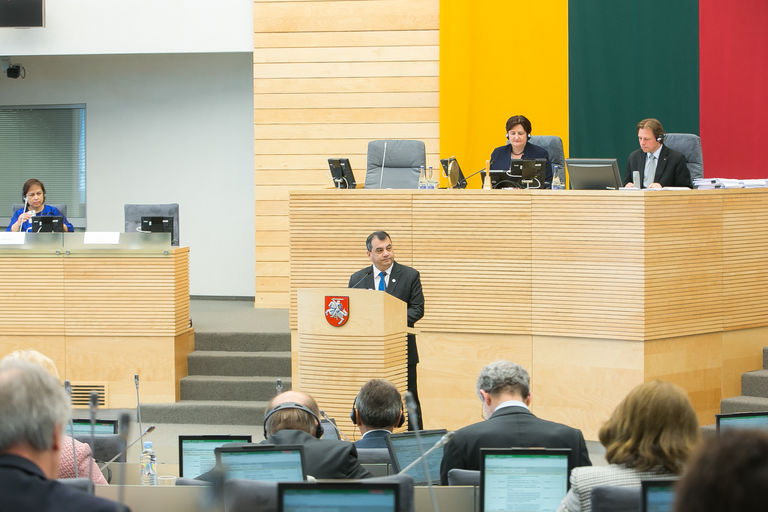Press release, 7 June 2016

Photo of the Office of the Seimas (author Olga Posaškova)
At its sitting of 7 June 2016, the Seimas marked the 25th anniversary of Lithuania’s renewed membership of the Inter-Parliamentary Union (IPU).
In her introductory address, Loreta Graužinienė, Speaker of the Seimas, remarked that the Seimas joined the IPU in 1923. “This was an important step that helped the new Republic to establish itself on the international arena. After the restoration of Lithuania’s independence, the Seimas resumed its IPU membership in 1991. Thus, we celebrate the 25th anniversary of IPU membership this year,” the Speaker of the Seimas said.
In the words of the Speaker, the IPU, established in 1889, brings together more than 160 national parliaments and is a crucial hub for dialogue and parliamentary diplomacy. “In close cooperation with the United Nations, the IPU makes a major contribution to resolution of international issues, protection of human rights and promotion of parliamentary democracy,” Mrs Graužinienė said.
The sitting was also attended by Saber Chowdhury, IPU President, a renowned Bangladeshi politician and Member of Parliament with significant experience in the field of interparliamentary relations, who delivered a speech on the occasion.
The IPU President made reference to Lithuania’s path to IPU membership and underlined the particularly important contribution of the country to IPU’s activities. In his view, Lithuania was a good example of how a nation that had lived under stringent authoritarian rule managed to follow a peaceful and democratic path of transition towards an open democratic society. “You have every reason to be proud of the progress you attained,” Mr Chowdhury said in his opening address.
The IPU President made a reference to the uniqueness of the IPU as the only global-level union of national parliaments. In his speech, Mr Chowdhury took the time to emphasise the need to promote the involvement of women and young people in policy-making and commended Lithuania’s achievements in the field.
Mr Chowdhury emphasised the role of national parliaments in dealing with the major current challenges such as migration to Europe, poverty, climate change and natural disasters, i.e. long-term problems with a lasting effect. The President believed that it was necessary to draw up national action plans and guidelines and this was where national parliaments could bring forth significant changes.
Rimas Rudaitis, Senior Specialist, Press Office, Information and Communication Department, tel. +370 5 239 6132, e-mail: [email protected]





